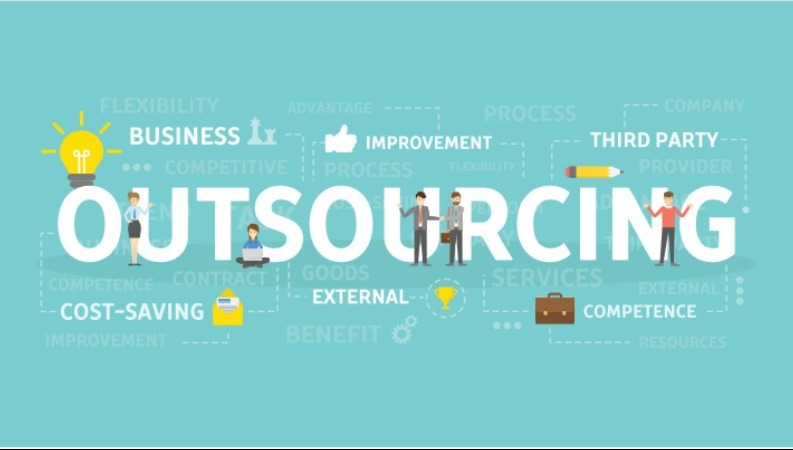OUTSOURCING FOR GROWTH

As a small business owner, the company has grown to an extent where you need an accountant, a lawyer, a content strategist and a tax advisor. But you cannot afford to put them on the payroll, and frankly, you don’t have the expertise to manage these roles. So, you’ve gone off the many freelancing platforms available. You post that you need freelancers to take up these tasks so you can focus on where the money is: convincing clients that your software company is nimble enough to deliver timely results. You get the freelancers but there is a catch: you will need to onboard each freelancer, make them understand your business ethos, teach them the peculiarities of your industry. Bottom line, you spend the next 6 weeks onboarding freelancers who will only work with you for 3 months. Then the cycle starts again. Mismanagement of critical business processes is one of the most common reasons why organizations fail to scale. Where a company wishes to allocate resources to processes that fundamental to the businesses, scholars and executives agree that outsourcing is the best route to growth. Outsourcing simply means that processes will become more efficiently done. When efficiency is established, business leaders can focus on core operations which will, in turn, lead to better outputs and increased business. Because Africa is gaining significant momentum as the next outsourcing continent with the radical industry growth experienced in the last 10 years, a company around the world who outsource to Africa will have access to some of the brightest and best minds in their fields without having to bear extraordinary costs. Outsourcing firms must by definition be up to date on the latest trends and technology in their industry. This knowledge is passed on to clients who may not have time for deep dive researches in areas that are not core to their business. So, companies can leverage specialized industry knowledge when they outsource.
5 SMART TIPS FOR CHOOSING A VIABLE OUTSOURCING PARTNER

Messrs ST Yakinson is an equipment manufacturer operating from Japan. Their clients are mainly in Europe. Over the years, as operations expanded due to increased business, activities such as payroll, inventory tracking, personnel management and material sourcing began to take its toll on the company. There was a high turnover of factory staff, entry and mid-level staff. The company recruited more staff to handle payroll and personnel management and a significant number of client care representatives to handle client complaints which increased by over 45% within two years. So, Messrs ST Yakinson outsourced. They outsourced about 80% of all back-office activities including material sourcing, client services, equipment purchase and maintenance, and personnel management. All was well in the first outsourcing year. By the second year, it became obvious that Messrs ST Yakinson was the only client of the outsourcing firm, as other clients had cancelled not renewed with them. Because of this decline, the outsourcing firm let go about 65% of their staff, keeping on barely enough hands to fulfil their contractual obligations to Messrs ST Yakinson. That affects the quality of service being provided as previously specialized services were now merged to reduce cost. By year three, Messrs ST Yakinson were back to the beginning — more client complaints, high staff turnover with an additional data breach of confidential proprietary information. Where did Messrs ST Yakinson go wrong? Let’s take a quick look at the process they should have taken when selecting an outsourcing partner. 1. Record of satisfied clients: would you trust your money to a financial institution that says yours is the first account they will be handling? How do you ensure that your funds are safe? History of satisfied clients with a critical look at the management team and financial assets gives one a sense of ease that such institution is OK to do business with. The same principle applies to outsourcing. While back-office operations can be a distraction for organizations whose expertise lie elsewhere, if not properly managed those operations can be the death of such an organisation. So, in choosing a viable outsourcing partner, ask for references from past clients to ascertain how long they have operated and how well they have served others. 2. Identify an area of specialization: Outsourcing firms have specializations. There are facility management companies, there are call centres and business process outsourcing companies like Outsource Global in Nigeria; there are also technical outsourcing partners. Understand aspects of the business which are non-core and shop around for an outsourcing partner in a renowned outsourcing destination like Africa. 3. Use of technology: how technologically ready is your proposed outsourcing partner? The hardware and software components of the outsourcing firm should be the latest available, with the capacity to integrate with resident systems of the contracting business. A clear communication line must be established; uninterrupted connectivity and power availability must be assessed. In essence, the operations of the outsourcing company must not interfere with their ability to provide the services your business requires. 4. Workforce Strength: If you are considering outsourcing because your business has to manage much non-core staff, you definitely should be looking out for an outsourcing firm that will is not cutting corners by piling workloads on limited hands. A viable outsourcing company is one that fully understands a clients process has made available the necessary manpower to carry out said processes. A way to know this is to review your partner’s hiring policies and processes to understand the technical and soft skills that they look out for when hiring. 5. Understand the costs: a rule of thumb is that businesses must never outsource their core processes. Any mishap with an outsourcing vendor will practically ruin the client’s business so businesses must be able to identify their core and non-core tasks. Also look at the cost of outsourcing: which region has the best rates with commensurate quality service? Africa is the new frontier in outsourcing and Nigeria is leading the charge to the best outsourcing destination in the region.
DBN Maiden Lecture

Outsource Global Wins Service Exporting Award

Outsource Global wins the Service Exporting Company of the Year Award. The company has been recognized as Nigeria’s premier business process outsourcing company. Speaking during the awards ceremony, the Founder and CEO of Outsource Global, Amal Hassan said “our goal is to make Nigeria the leading outsourcing destination in the world. This article was originally published by TheGuardian
CHOOSING AN OUTSOURCING PROVIDER

It is important to note that the decision to undertake a Business Process Outsourcing initiative is not just to save cost or reduce overheads; it is also one of performance improvement of business functional areas that are critical. If the organization’s support team is overwhelmed by customer enquiries, then there is the need to consider a Business Process Outsourcing agency. If the development of an organization’s new product is slow, then there is the need for a Business Process Outsourcing provider. In each of these examples, the choice of embarking on the journey to outsource some of the business processes is based on improving the company’s performance in that process. With this advantage, it is therefore important that your organization choose a Business Process Outsourcing vendor carefully and systematically in order to minimize risk. The first step in choosing a Business Process Outsourcing vendor is to recognize that this is not just any other kind of project, but a technical one. Hence, the need to select individuals from the company that would act as the Business Process Outsourcing project management team. The reason for this is because the character of outsourcing business processes of an organization dictates the need for interdisciplinary skills to manage the outsourcing project and since such skills can hardly be found in one individual, managing the outsourcing process will most likely require a team. The team should have a head, who in this case is a member of the executive team. She, together with the chosen team members would be responsible for coming up with the outsourcing strategy, selecting and scrutinizing the outsourcing vendors, communicating its connection with corporate strategy, and making sure that the goals of outsourcing the organization’s business processes are achieved. The responsibility of choosing individuals representing the major departments (e.g. IT, Finance, Human Resource etc.) of the organization, who also work with the intending outsourced process on a daily basis also rests on his/her shoulders. Team members must be carefully chosen for their commitments to the organization, their capacity to embrace change, knowledge about the flaws and bottlenecks of the process and their capability to communicate and work with individuals from different disciplinary backgrounds. Choosing an outsourcing provider can be tedious by nature, since finding the right one is absolutely critical. There are numerous steps and processes in between putting a team together to eventually finding the right outsourcing business partner. Think of Outsource Global when your organization decides to eventually outsource its business processes. With our different range of services, from IT, market research, asset management, sales and marketing to customer relations that would cater to your company’s specific needs, we are your go-to outsourcing partner. We would meet and exceed every management, technological and strategic requirements which would enable your organization better strategize and focus on how to work with the current state of the market and attract more clients.
Increase Productivity and Efficiency with Business Process Outsourcing

In today’s competitive world, successful businesses are often resourceful ones that apply innovative processes to significantly lower overhead costs without sacrificing quality and productivity levels. In fact, utmost importance is given to profitability at every level, and if any necessary business processes are non-core, then the alternative would be to outsource those functions for better productivity. Today, Business Process Outsourcing (BPO) is considered not only a simple cost-cutting mechanism but also a strategic initiative used to improve the quality of business processes while managing the bottom lines of a company. Outsourcing describes an arrangement whereby a company provides services for another company. This concept is not new, but it has evolved in recent times. The perception about outsourcing has gone beyond engaging a particular company for a specific operation (e.g. hiring security firms for superior security services and advice) to delegating or subcontracting non-core business processes to third-party agencies. If a business is then able to focus exclusively on its core business activities, costs will be reduced, overall efficiency improved and quality service rendered to its clients. The BPO industry is developing rapidly, indicating the increasing demands of organisations who must balance cost, productivity, and performance. It is, therefore, becoming inevitable for businesses to outsource some of its important services to not only achieve its business outcomes quickly but also to increase profitability per business process. BPO services that can be offloaded to be performed and managed by other agencies include market research, software development, accounting, human resource management, estate management, specialist support, etc. With an established local and global footprint in Nigeria, United Kingdom (UK), United States of America (USA) and Japan, Outsource Global is strategically positioned to cater to the needs of companies both in the developed and growing economies. The company offers BPO services such as data mining and training, image tagging, software development, remote sales development, market research, and back office outsourcing. Outsource Global currently serves clients in social advocacy, social networking, engineering and information technology, banks and public sector organizations.
Amal Named among Emerging Leaders of U.S. Global Women’s Mentoring Partnership

Amal Hassan has been named among emerging leaders named in the 2018 Fortune-US Department of State Global Women’s Mentoring Partnership. She is a Nigerian technopreneur and Chief Executive Officer of Outsource Global. Amal had multiple sessions at Y&R a global leading branding and communications powerhouse. Amal focused on developing critical leadership, professional and business skills during her mentorship with Shelly Diamond. Originally published by TheGuardian